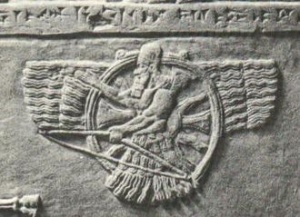Asuras

Asuras (Sanskrit: असुर) are a class of beings or power-seeking clans related to the more benevolent Devas (also known as Suras) in Hinduism. ... Asuras are part of Indian mythology along with Devas, Yakshas (nature spirits) and Rakshasas (ghosts, ogres). Asuras feature in many cosmological theories in Hinduism.
"... in the Rig Veda, the word Asura is an adjective which means strong or powerful, an'd is invariably applied to gods except in the very last hymns of the last Mandala. In the BrAhmanas the word changed its meaning altogether, and Wcis applied to the enemies of gods about whom many new legends were invented." "A History Of Civilization In Ancient India", Chapter Vlll. Sacrificial Rites and Legends of the BrAhmanas
"The identification of the Asuras of Indo-Iranian mythology with the Assyrians was first suggested by Mr, H. M. Chadwick." Were the Asuras Assyrians?, Hannes Sköld, The Journal of the Royal Asiatic Society of Great Britain and Ireland, No. 2 (Apr., 1924), pp. 265-267 Published By: Cambridge University Press.
Ashur, also Assur, Aššur (Sumerian: 𒀭𒊹 AN.ŠAR2, Assyrian cuneiform: Rassam cylinder Anshar.jpg Aš-šur, also phonetically 𒀭𒀀𒇳𒊬 da-šur₄)[1] is an East Semitic god, and the head of the Assyrian pantheon in Mesopotamian religion, worshipped mainly in the northern half of Mesopotamia, and parts of north-east Syria and south-east Asia Minor which constituted old Assyria. He may have had a solar iconography.